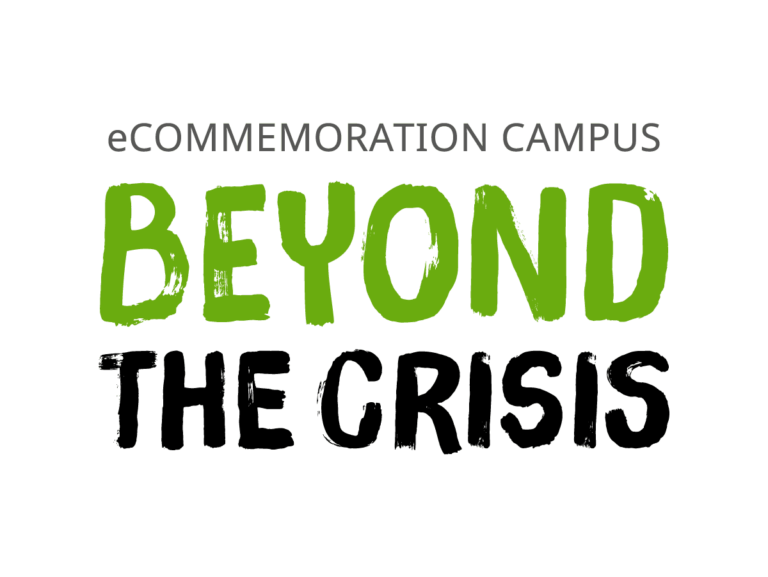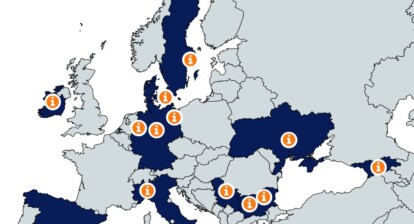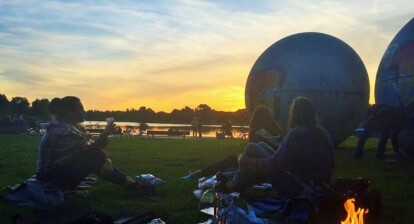Zentrum Weissenburg in Stuttgart (Germany)
A safe space for LGBTQ+ people
By Anna, participant of the eCommemoration Campus 2020
Imagine that you're sitting in a classroom. You're a young teenager. A girl that just turned 16. On your birthday your parents jokingly asked you when you will bring your first boyfriend home. But you can't imagine dating a boy. You were really close to just saying: "Never". But you didn't dare to say that. You didn't dare because your uncle made blatantly homophobic comments when he came over on Christmas. Everyone laughed. No one said anything.
A teacher entered the classroom. He was wearing a pink shirt. Some people snickered. They have been making fun of him for a while now, because how they put it, "He dresses so gay".
The girl sitting next to you has short hair. That is the only reason they needed to title her a lesbian. It's easy to understand that they mean it as an insult when you hear how they emphasize it.
You try to push it away. Tell yourself that these are just jokes. That it doesn't mean anything. But all together it weighs on you. You don't know how much longer you will be able to push it away.
How do you feel?
A teacher entered the classroom. He was wearing a pink shirt. Some people snickered. They have been making fun of him for a while now, because how they put it, "He dresses so gay".
The girl sitting next to you has short hair. That is the only reason they needed to title her a lesbian. It's easy to understand that they mean it as an insult when you hear how they emphasize it.
You try to push it away. Tell yourself that these are just jokes. That it doesn't mean anything. But all together it weighs on you. You don't know how much longer you will be able to push it away.
How do you feel?
1
LGBTQ+ people in Germany
The protagonist of the scenes above doesn't have to be a lesbian girl. It could also be the transgender woman who is frequently misgendered. The asexual teen who has nearly no representation in the media. The bisexual man who is told that he should pick a side already.
And this list could go on for at least the entire page or even further. It doesn't matter if someone is confident in their sexuality or gender or questioning them, if someone is out or closeted (i.e. not outed), if they speak out or keep to themselves. Discrimination is something a lot of people in the LGBTQ+ community have to deal with. Even in a state that seems open and tolerant, like Germany.
And this list could go on for at least the entire page or even further. It doesn't matter if someone is confident in their sexuality or gender or questioning them, if someone is out or closeted (i.e. not outed), if they speak out or keep to themselves. Discrimination is something a lot of people in the LGBTQ+ community have to deal with. Even in a state that seems open and tolerant, like Germany.

Joachim Stein
is a association president of Zentrum Weissenburg. Zentrum Weissenburg is an association for LGBTQ+ people in Stuttgart.
“
"At the moment I'd hypothesize that the gays and lesbians have caught on well in this city's community. Especially when we consider that a fair share of the local politicians are part of the community and publicly admit this. Where this looks different are the groups transgender, transexual and intersexual. This community is still developing at the moment."
Troubeling studies
In a study from 2017 four out of ten (43,8%) of the questioned stated that "homo- and bisexuals should stop making such a big deal about their sexuality." Unfortunately, homophobia isn't only a thing that people experience from strangers. A lot of LBTQ+ people have to deal with intolerance in their own families. In the study four of ten people (39,8% when the daughter is lesbian, 40,8% if the son is gay) stated that they would have a problem with their kid being homosexual.
This is why protecting LGBTQ+ people and educating people on the topic is still very important.
This is why protecting LGBTQ+ people and educating people on the topic is still very important.
LGBTQ+ community
The LGBTQ+ (Lesbian, Gay, Bisexual, Transgender, Queer; + stands for others sexual orientations and gender identities) community includes people whose gender identity and or sexual orientation differs from heterosexual (man loves women, woman loves men) and cisgender (which means that the gender identity is the same as the one they were assigned at birth). Both are unfortunately often seen as the norm in our society.
Laws to protect people in the LGBTQ+ community
There have been a lot of steps made to protect members of the LGBTQ+ in Germany, and the society has become more accepting. For example, the "Allgemeines Gleichbehandlungsgesetz" (Anti-Discrimination law) that was passed in 2006. This law made it possible for people who are being discriminated against - for example because of their gender or sexual identity - to take legal action against it. Since October 2017 same-sex marriage has become legal, this also applies to same-sex couples adopting children together.
Here you can find further information provided by the
Federal Anti-Discrimination Agency: General Act on Equal Treatment
Here you can find further information provided by the
Federal Anti-Discrimination Agency: General Act on Equal Treatment
2
"A place where I definitely don't have to pretend"
As early as the 1970s, there were talks about a gay-lesbian centrum. There was even one for a short time from 1973 till 1974, but it was closed because the idea was too innovative at the time. After that there were still discussions, but people didn't agree on how this centrum should look, especially the size was a point of contention.
It took another twenty years until the organisers of this initiative where approached by someone who offered them rooms that he would rent to them. There were doubts, but finally the project team agreed to take this important step.
It took another twenty years until the organisers of this initiative where approached by someone who offered them rooms that he would rent to them. There were doubts, but finally the project team agreed to take this important step.
~
“
"We had a long meeting where we went through all of the pros and cons. At the end we said: If we don't try it, it will definitely fail. If we try it, it still might fail, but it's worth a shot."
~
They didn't fail. The Zentrum Weissenburg, founded 1996, is an association that works on keeping communication within the community going, offering a safe space for the community and communicating with the urban society.
More than just a café
Groups for teens and adults meet in the café of the Weissenberg Zentrum. For example, the group "Königskinder" ("Royal Children") for gay and bisexual boys, a lesbian dancing class, two different choirs, an improvisational theatre group and a LGBTQ+ refugee group.
Besides the café there are also larger rooms that are used as a venue.
On the picture on the right the interior of the café can be seen.

“
"It means to me that I have a place where I know that the people have been through the same or similar things that I have. A place, where I definitely don't have to pretend, and I can talk unhurriedly with everyone about everything. "
But the café isn't only a place for groups. It's also for individuals. To make it an open place for everyone, most items on the menu and drinks are offered at a low price. Thus people can meet here even if they normally couldn't afford to go out.
Because of the Covid-19 pandemic, gastronomical businesses in Germany are closed. This puts the café in an existence-threatening situation. In spring 2020, the center was only able to bridge the closure with government aid.
Because of the Covid-19 pandemic, gastronomical businesses in Germany are closed. This puts the café in an existence-threatening situation. In spring 2020, the center was only able to bridge the closure with government aid.
3
Hopes for the future
The LGBTQ+ community has come a long way and achieved a lot. But still many personal and social struggles will lie on the way ahead. It's easy to get through such struggles with help from people, that have been through the same.
It's clear how much of an impact the Zentrum Weissenburg and the people who are active there have made on the community and on many individuals. Safe places like this are greatly needed. This is why I hope that it will make it through Corona times.
I asked teens in the LGBTQ+ community what their hopes for the future of the community are.
It's clear how much of an impact the Zentrum Weissenburg and the people who are active there have made on the community and on many individuals. Safe places like this are greatly needed. This is why I hope that it will make it through Corona times.
I asked teens in the LGBTQ+ community what their hopes for the future of the community are.
Hopes
of teens for the future of the community
Teen
"I think it's good that (...) more and more people find the courage to go to associations like this to open up and accept themselves."
Anne
"My hope for the community is to move forward and succeed as one without gays of colour, disabled gays, poor gays, etc., getting sidelined."
Teen
"Above all my hope is that it gives a lot of people strength to know that they aren't alone and that the 'who-belongs-to-the-community/doesn't-belong' discussion becomes completely irrelevant."
Sanbang
"My hope for the future is that queer people, however they identify and whoever they love, will be treated equally and that as many people as possible will go on standing up against discrimination. There is no 'race', 'normal' or 'abnormal', we're all just human beings."
Johanna
"We are going to make it. Love is going to win."
Luca
"We are always told not to tell anyone that we are part of the LGBTQ+ community because it could have a negative impact on our working lives, but that is when we have to speak out loud that we exist. Fewer and fewer young people let themselves be beaten down and that is a good thing. At school our English teacher has taught the students some terms (e.g. coming out, in the closet, etc.) so that they as cishets* also understand this. More and more the LGBTQ+ community becomes more present and everyday, that is good. I look positively into our future as long as this continues."
*An abbreviation of cisgendered or cissexual heterosexual.
*An abbreviation of cisgendered or cissexual heterosexual.
Sources
Der geschäftsführende Vorstand Weissenburg e.V., Zentrum LSBTTIQ Stuttgart: "Weissenburg muss wieder schließen", http://www.zentrum-weissenburg.de/2020/11/04/weiss..., last visited on 30.11.20.
Jennifer Fritsch: "Ehe für alle: Diese Rechte haben gleichgeschlechtliche Paare", https://praxistipps.focus.de/ehe-fuer-alle-diese-r..., published on 30.11.20, last visited on 30.11.20.
"Studie zu Einstellungen gegenüber Lesben, Schwulen und Bisexuellen:
Mehr als 80 Prozent der Menschen in Deutschland für „Ehe für alle",
https://www.antidiskriminierungsstelle.de/SharedDo..., published on 12.01.17, last visited on 30.11.20.
"Allgemeines Gleichbehandlungsgesetz (AGG)" in "Lexikon der kleinen Unterschiede - Begriffe zur sexuellen und geschlechtlichen Identität", published by Ministerium für soziales und Integration Baden-Württemberg, 3rd edition, published in 2018.
Interview with Joachim Stein and several LGBTQ+ teens.
Credits of all photos: private
Der geschäftsführende Vorstand Weissenburg e.V., Zentrum LSBTTIQ Stuttgart: "Weissenburg muss wieder schließen", http://www.zentrum-weissenburg.de/2020/11/04/weiss..., last visited on 30.11.20.
Jennifer Fritsch: "Ehe für alle: Diese Rechte haben gleichgeschlechtliche Paare", https://praxistipps.focus.de/ehe-fuer-alle-diese-r..., published on 30.11.20, last visited on 30.11.20.
"Studie zu Einstellungen gegenüber Lesben, Schwulen und Bisexuellen:
Mehr als 80 Prozent der Menschen in Deutschland für „Ehe für alle",
https://www.antidiskriminierungsstelle.de/SharedDo..., published on 12.01.17, last visited on 30.11.20.
"Allgemeines Gleichbehandlungsgesetz (AGG)" in "Lexikon der kleinen Unterschiede - Begriffe zur sexuellen und geschlechtlichen Identität", published by Ministerium für soziales und Integration Baden-Württemberg, 3rd edition, published in 2018.
Interview with Joachim Stein and several LGBTQ+ teens.
Credits of all photos: private





